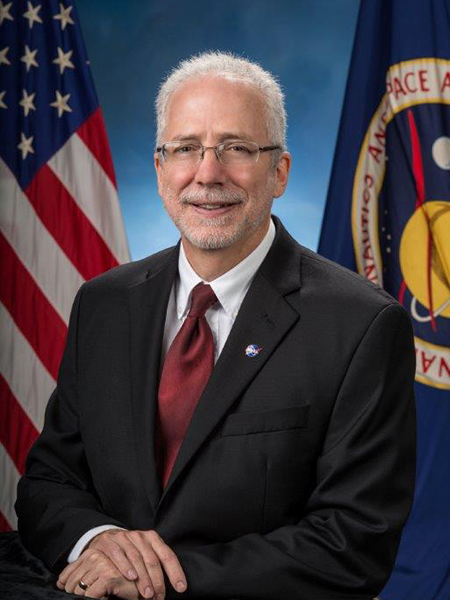Mark S. Geyer (1958-2021)
Director, Johnson Space Center, NASA
BSAAE '82, MSAAE '84
For his highly distinguished 30-year career at NASA providing strategic direction for all aspects of human spaceflight exploration missions, including the establishment of the International Space Station (ISS) and the Orion program, that continue to bring NASA another step closer to sending astronauts to deep space destinations.
Five-times recognized by NASA for his exceptional service and outstanding leadership, Mark Geyer spent 31 years living the sort of NASA dream that many aspire to, but very few achieve.
He held several leadership roles with NASA's International Space Station (ISS). As the chair of the Mission Management Team and NASA lead negotiator with Russia, Geyer was responsible for coordinating operations between NASA, the Russian Space Agency and their contractors for the construction of the ISS. His leadership led to the construction of the ISS and its success as the world's first space station. As manager of the ISS Integration Office, he defined the ISS assembly sequence and technical integration of space station elements between the international partners.
Under Geyer's direction, the Orion Program conducted successful tests in space that contributed significantly to NASA's ability to send astronauts to deep-space destinations.
Saying he's been “very blessed” to be a part of many accomplishments, Geyer, who clearly relished a challenge, shared some of his most rewarding accomplishments during the early years spent planning and building the ISS.
"The reason it was so satisfying was that it was very difficult,” he recalled. “We were not only bridging engineering challenges but also cultural and language challenges working with the Russian space team. We had to learn their culture as well as their engineering techniques in order to negotiate sound choices for the finished plan."
Geyer said one memory from 1998 stands out as especially meaningful: "It was when astronaut Bob Cabana and cosmonaut Sergei Krikalev first floated though the interface between the Russian and American segments. The fact that they could safely enter the space station at this early point in assembly showed that all of the hard integration and test work we had done — to show that the American and Russian hardware would work together when assembled in orbit — had paid off. The successful berthing was just the beginning of the International Space Station's history."
In 2018, Geyer was named director of the Johnson Space Center, home to the nation's astronaut corps and human space flight research and training. In that role, he led a workforce of approximately 11,000 civil servant and contractor employees and an annual budget of more than $5 billion while managing a broad range of human spaceflight activities.
Geyer's work has been celebrated by NASA with five awards: In 2000, an Exceptional Service Medal; in 2004, the Space Flight Awareness Leadership Award; in 2006, a Meritorious Executive Rank Award; in 2011 the Distinguished Executive Rank Award; and in 2015, NASA's Distinguished Service Medal. Purdue University’s School of Aeronautics and Astronautics recognized Geyer for his professional contributions to his chosen profession with the 2016 Outstanding Aerospace Engineer Award.
After leaving an indelible mark on the development and future of human spaceflight missions, and as director of Johnson Space Center, Geyer played a critical role in the next age of space travel and exploration.
Career Highlights
| 2018-2021 | Director, Johnson Space Center, NASA |
|---|---|
| 2017-2018 | Acting Deputy Associate Administrator, Human Exploration Mission Directorate, NASA |
| 2015-2017 | Deputy Director, Johnson Space Center, NASA |
| 2007-2015 | Program Manager, Orion Program, NASA |
| 2005-2007 | Deputy Program Manager, Constellation Program, NASA |
| 2004-2005 | Manager, Operations Integration, International Space Station, Johnson Space Center, NASA |
| 2000-2004 | Manager, Program Integration, International Space Station, Johnson Space Center, NASA |
| 1994-2000 | Various roles, International Space Station Program, NASA |
| 1990-1994 | Systems Engineer, Lunar and Mars Exploration Office, NASA |
Education
| 1982 | BS Astronautics and Aeronautics, Purdue University |
|---|---|
| 1984 | MS Astronautics and Aeronautics, Purdue University |

